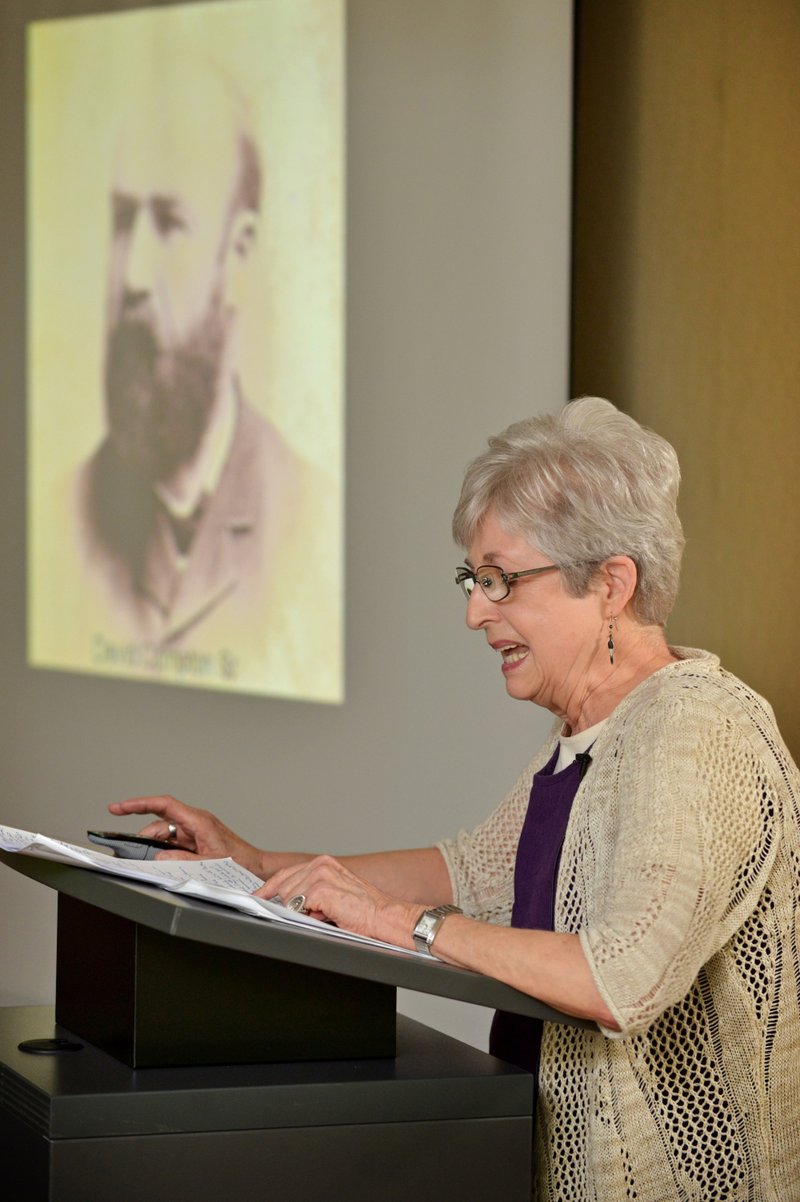BENTONVILLE -- David Compton Sr.'s wife's family wasn't happy when he moved his family to Northwest Arkansas in 1895.
"Dear Sister! We received your letter and were almost sick over it," Ellen Compton read from a 1896 letter sent by David's sister-in-law, who lived in Philadelphia. "To think you had gone so far away and into such a part of the country. Was there no other spot on earth that David could have selected than such a wilderness ... for it is certainly a mistake to take a wife and family in such a wilderness as that."
David Compton Sr. was Neil Compton's grandfather. Neil Compton, after whom Compton Gardens is named, is Ellen Compton's father.
Ellen Compton read the letter as part of her presentation, "Native Born Naturalist," at Compton Gardens on June 18.
The presentation was part of Compton Gardens' 10 in 10 Series celebrating the center's 10 years of being open, said Corrin Troutman, executive director. The 10 programs are to help educate the public about Compton Gardens.
"It was a natural fit that we asked Ellen Compton to come speak about her father and her family because that's a very important and crucial reason why Compton Gardens exists," Troutman said in her opening remarks.
Neil Compton was a physician and conservationist. He's known for establishing the Ozark Society to Save the Buffalo River, which is now known as the Ozark Society Inc., according to the Encyclopedia of Arkansas History and Culture.
Ellen Compton began with her great-grandfather, David Compton Sr. He was the youngest of 11 children, Princeton-educated and served as a schoolmaster in Iowa before moving his wife and three children to Orchard, which is Gentry today, in 1895. They bought land and established a farm, Ellen Compton said.
David and his wife, Mary, established family roots in Arkansas despite his family-in-laws' displeasure.
Ellen Compton spoke about her ancestors' lives on the farm, their struggles, and their day-to-day activities. Much has been recorded through photographs, letters and personal journals.
David Compton Jr. was one of David Compton Sr.'s three children. David Compton Jr. married Ida Wilmoth, who came from a "big rambunctious family," as Ellen Compton described them. The couple had two children, Neil and his younger sister, Edra.
The family lived on the Compton property in what is Gentry today. The family moved to Bentonville after David Compton Jr. was elected Benton County judge in the 1920s. They moved back to the farm after he lost the seat two years later, then moved back to Bentonville when he was again elected, Ellen Compton said.
Neil Compton graduated from Bentonville High School in 1931 and then from the University of Arkansas in 1935 with degrees in zoology and geology, according to the Encyclopedia of Arkansas History and Culture.
Compton spoke of her father's love for nature, his observant eye and his experiences floating the Buffalo River. She spoke of his marriage to Laurene Putman and their medical studies in Little Rock.
Compton touched on her father's positions as the health officer in Bradley and Washington counties and his service in the U.S. Naval Reserve. She didn't address Neil Compton's conservation work regarding the Buffalo River.
It's what he's most known for, so she wanted to present history of him and his family that isn't as well known, she said.
Neil Compton led the Ozark Society to Save the Buffalo River's campaign efforts to stop the construction of two dams along the river proposed by the Army Corps of Engineers in the 1960s, according to the Encyclopedia of Arkansas History and Culture. President Richard Nixon signed the bill March 1, 1972, that made the Buffalo River of Arkansas the first designated National River in the National Park System.
Neil Compton received many awards for his conservation work. He died in 1999 at age 86.
Elaine Rooney of Bella Vista was one of about 40 to 50 people who attended the presentation. She's a Benton County master gardener and wanted to take advantage of learning more about the Compton family since she was familiar with the gardens.
"I could relate to her sister saying, 'Why in the world are you going to Arkansas' because we heard that so many times," Rooney said of when she moved from Minnesota in 2002. "They don't realize all the things we have down here and the beauty of the country. I just thought, they were saying that way back when, and they're still saying it today."
Photo exhibit on display
A 35-photograph exhibit "From Coon Hollow: Modern Images of Dr. Compton's Boyhood Landscape" by Terry Stanfill, local wildlife photographer, will be on display at Compton Gardens through July.
Source: Staff report
Melissa Gute can be reached at [email protected] or on Twitter @NWAMelissa
Ellen Compton spoke about her ancestors' lives on the farm, their struggles and their day-to-day activities. Much has been recorded through photographs, letters and personal journals.
General News on 07/01/2015
